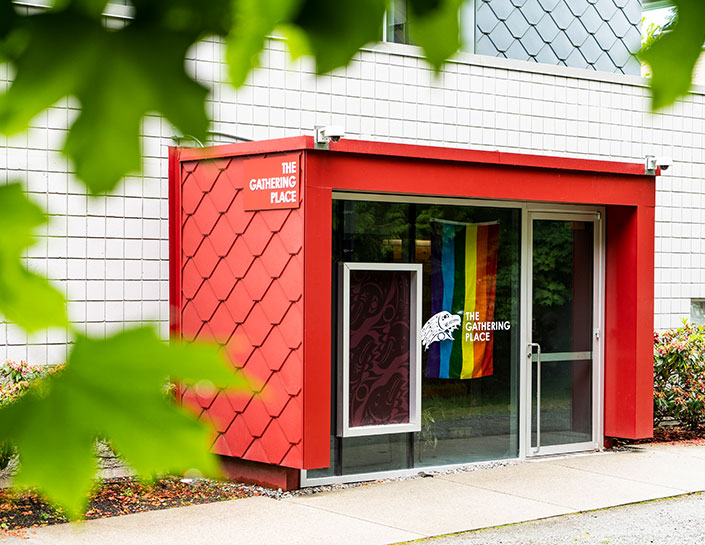
hən̓q̓əmin̓əm̓ and Indigenous Languages at KPU
hən̓q̓əmin̓əm̓ is the language spoken by people of the Kwantlen, Katzie, Tsawwassen, Kwikwetlem, and Musqueam First Nations on whose traditional territories our university is built. hən̓q̓əmin̓əm̓ is also known as a Down River dialect of Halkomelem, under the Salishan language category.
At Kwantlen Polytechnic University, we are committed to advancing Reconciliation and weaving Indigenous knowledge, values, and representation into our organization. Part of our responsibility for systemic transformation includes honoring Indigenous languages at KPU. In our not-too-distant history, Indigenous languages were once illegal to speak, record, and share within Canada. Colonialism has had and continues to have a devastating effect on the survival of Indigenous languages across North America. We believe it is our role and responsibility to listen and learn Indigenous languages and follow revitalization work led by Indigenous Language Keepers. We raise our hands in gratitude to Sesmelot (Fern Gabriel), hən̓q̓əmin̓əm̓ Language Instructor and Consultant from Kwantlen First Nation.
The hən̓q̓əmin̓əm̓ Language Initiative seeks to embed the language into many features at KPU.
Embedding the language will help encourage our communities to learn the traditional language of the territories and respect the visual representation of the land-based Nations.
- Building signage
- Facility directories
- Territory acknowledgements
- Corporate email signatures
- Policies, protocols, and institutional documents
- Special projects
- Official greetings by KPU leaders
- Everyday use and recognition
Signage at KPU
ʔəm̓i ce:p kʷətxʷiləm ʔi ʔə tə n̓a leləm̓s tə q̓ʷa:n̓ƛ̓ən̓ (Welcome to the house of Kwantlen)
m̓i ce:p kʷətxʷiləm (Welcome everyone)
pukʷew̓txʷ (Book house (library))
χʷəχʷéy̓əm (Oral story telling)
q̓ʷa:n̓ƛ̓ən̓ (Kwantlen)
χpey̓əɬp (Cedar)
χiθəɬp (Alder)
sic̓əɬp (Vine)
c̓sey̓əɬp (Douglas)
sək̓ʷəməy̓ (Birch)
st̕ᶿicəm (Hazelnut)
məllə́m̓əɬp (Hemlock)
q̓ʷeχt (Garden)
c̓q̓ʷəɬp (Spruce)
qa:nəɬp (Arbutus)
q̓əmənəɬp (Maple)
sq̓əq̓ipéw̓txʷ (Gathering House (The Gathering Place))
sθe:w̓txʷ (Big house/main meeting area)
c̓ec̓əw̓ət tə leləm̓ (Helping House (Indigenous Services))
Common Phrases at KPU
k̓ʷəcnámə cən (See you)
m̓i ce:p kʷətxʷiləm (Welcome everyone)
Special Projects at KPU
k̓ʷam̓k̓ʷəm̓ kʷθə šxʷqʷeləwən ct ʔə tə n̓a xeɬ (We have strong minds on this path (ODOM: Open Doors Open Minds))
Territory Acknowledgement
ʔi ʔə tə n̓a təməxʷ ʔə ƛ̓ šxʷq̓ic̓əy̓aʔɬ, šxʷq̓ʷa:n̓ƛ̓ən̓aʔɬ, šxʷmeθxʷəyaʔɬ ʔiʔ səmyəmaʔɬ məsteyəxʷ (This is the land of the Katzie, Kwantlen, Matsqui and Semiamhoo people (Langley Campus))
xéʔelɬ KPU Pathway to Systemic Transformation
xéʔelɬ (Pathway)
təməxʷ (Land)
Pathway 1. Reflecting Upon Our Own Biases
nəc̓əʔmət ct (we are united/community)
Pathway 2. Open to the Community
sɬiʔaʔəqʷt (future generations)
Pathway 3. Indigenous Voices Matter
ya:y̓əstəl̕ (work together)
Pathway 4. Holistic Learning and Wellbeing
sɬənət (to weave)
Pathway 5. Weaving Indigenous Worldviews
ʔi łé ʔé (Let's Go)
Pathway 6. Thought Meets Action
snəwey̓əɬ (cultural teachings)
səy̓em̓stəxʷ (respect)
cakʷ xʷəʔəy̓ (become better)
ʔəy̓ tə ya:y̓s (good work)
